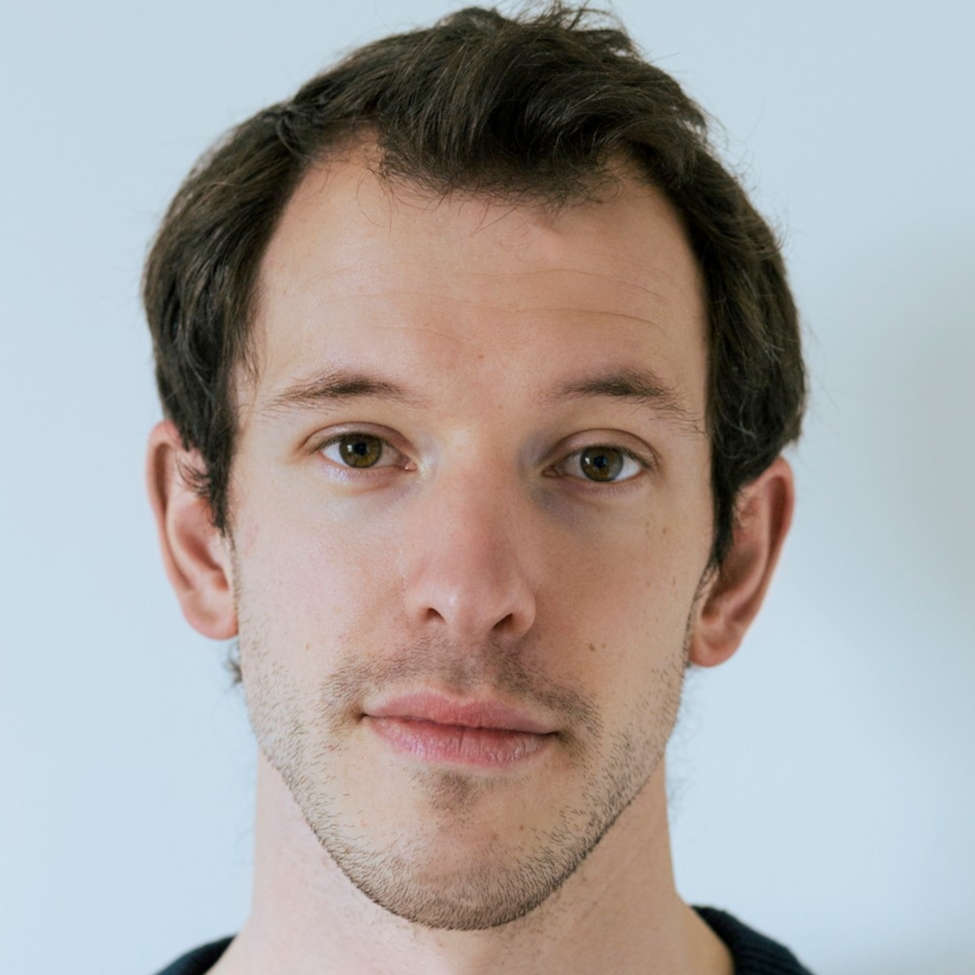On the cusp of a breakthrough – No more mistaking Pfeiffer Georgi
Team DSM's road captain talks about her evolution in professional cycling
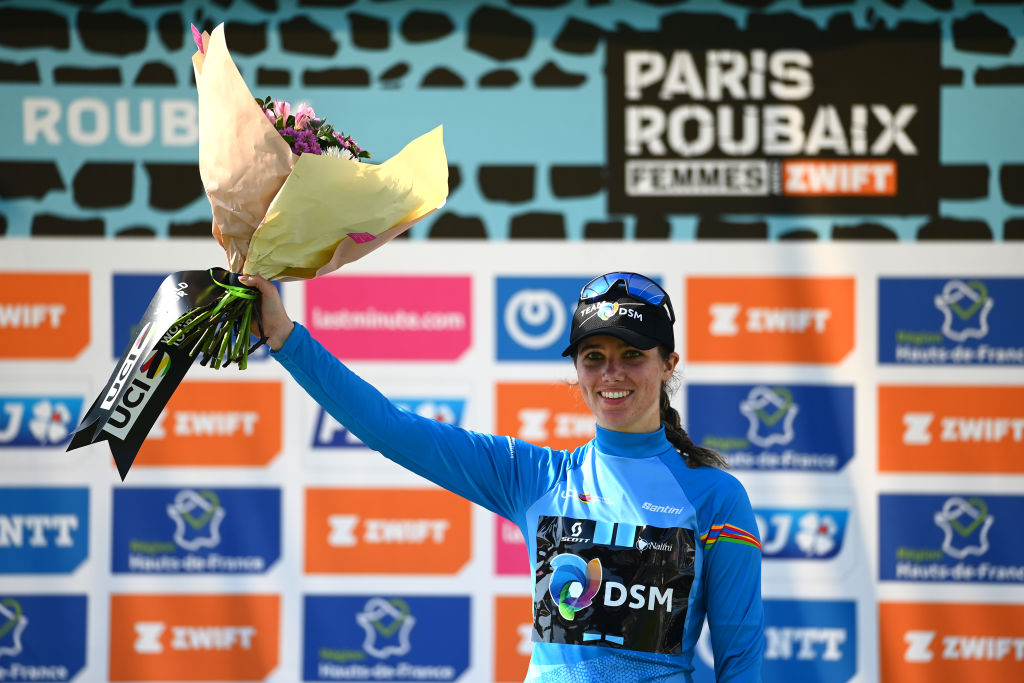
When the 2022 racing season ended, Pfeiffer Georgi didn’t stop. Legs still aching after Binche-Chimay-Binche, she and DSM teammate Charlotte Kool flew straight to the capital of Italy on a three-day sightseeing holiday of gelato, pizza, pasta and charming churches.
So, she knows firsthand that Rome wasn’t built in a day. The maxim ring trues for her own racing career too. Rather than an incandescent rise to glory, every season has brought gradual gains and lessons learned under the radar.
She has spent the last two years as the team’s road captain and a guiding force for Lorena Wiebes, but the potential for earning results in her own right is clear. Her spring highlight was ninth place at Paris-Roubaix. Then, in August, she took her first WorldTour podium at the Postnord Vårgårda WestSweden road race. She was upgraded to second place after sprinting against breakaway companions Marianne Vos and Audrey Cordon-Ragot as the legendary Dutchwoman was disqualified for using an illegal aerodynamic position.
Entering her fifth season as a pro with Team DSM, the 22-year-old is simultaneously an old hand and an exciting talent. She sums up her career so far as “a lot of development”, physically and personally. “When I joined, I wouldn’t have said I would be road captain. I was shy and quiet, I didn’t want to say anything or ask any questions,” Georgi tells Cyclingnews. “I’ve learned so much stepping up from junior; it’s quite a big jump.”
“My first two years, I was terrified in the bunch. I’ve definitely improved a lot. When I’ve got someone in my wheel that I have to lead out, or Charlotte [Kool] and Lorena behind me, I’m just so much more assertive and can move through the bunch because it's my responsibility to get them there. Sometimes I find that easier than when I’m leader and have to get my way through. It gives me the extra incentive.”
In 2022, she was chief stoker of the Wiebes express, lending her cool head and big engine to guiding the dazzling Dutchwoman to her most prolific season yet. Georgi was on board for 19 of her 23 wins in 2022. The one that stands out for her was the Tour de France Femmes opener on the Champs-Élysées, coming from way down the pack in the final kilometre to come out on top.
However, as Wiebes joins Team SD Worx, it’s all change. Seven new riders join a Team DSM roster whose oldest rider is 25: new season, new dynamic. “I think Charlotte [Kool] is a really good sprinter, and we can use her as our sprint card. Maybe it’ll change the way that we can maybe race a bit more aggressively and still have a lot of different cards to play in the Classics, for example,” Georgi says.
Get The Leadout Newsletter
The latest race content, interviews, features, reviews and expert buying guides, direct to your inbox!
“Again with Charlotte, also there’s Megan [Jastrab], and then GC-wise, Juliette [Labous] had an amazing season … it’s obviously different losing a big sprinter, but I think there’s a lot of opportunity to do really well with the team we’ve got.”
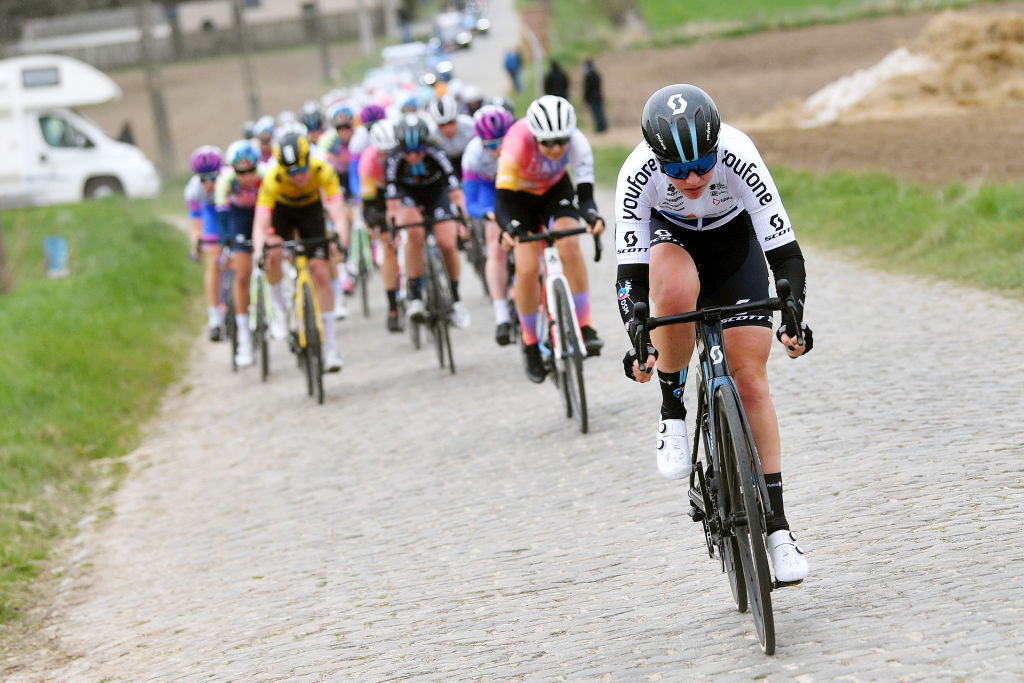
She modestly leaves her own name out of that mix, but Georgi will also have more chances to be leader or joint leader, while supporting the team. “It’s nice to be starting to get more opportunities for myself,” she says.
Paris-Roubaix and the Tour of Flanders stand out for Georgi as dream races to win. Her debut on the French pavé in 2021 still sticks in her mind. “That was awful, the most pain I’ve ever been in,” she says. “I crashed so many times, it was just physically hard, bodily hard, everything hurt. I got to the velodrome very slowly and was thinking ‘I don’t think this is the race for me.’ I came into this year without many expectations and I just felt great on the day. I still made quite a few mistakes, it’s such a fight for position.”
Coming from a family where her parents and brother all raced bikes, it was inevitable that she’d watch the men’s equivalent of those races from a young age. “This is your life, welcome,” she says, laughing at the idea of being plonked in front of the TV as a four-year-old.
Her cycling education continued apace around her home country lanes in Gloucestershire and the Cotswolds, 200 kilometres west of London. Riding the narrow, short hills there can be like doing a Belgian classic without the cobblestones.
She was one of the world’s best juniors, winning Trofeo Binda and Gent-Wevelgem. Georgi has quickly evolved into a respected road captain, with several teammates and directeur sportifs noting her tactical nous and decision-making under pressure.
She name-checks her dad Peter as a key factor for that: “As a youth and junior, he’d always teach me little things, we’d talk about racing quite a lot. And I’ve always been interested in watching cycling, you start to develop more of a tactical awareness.”
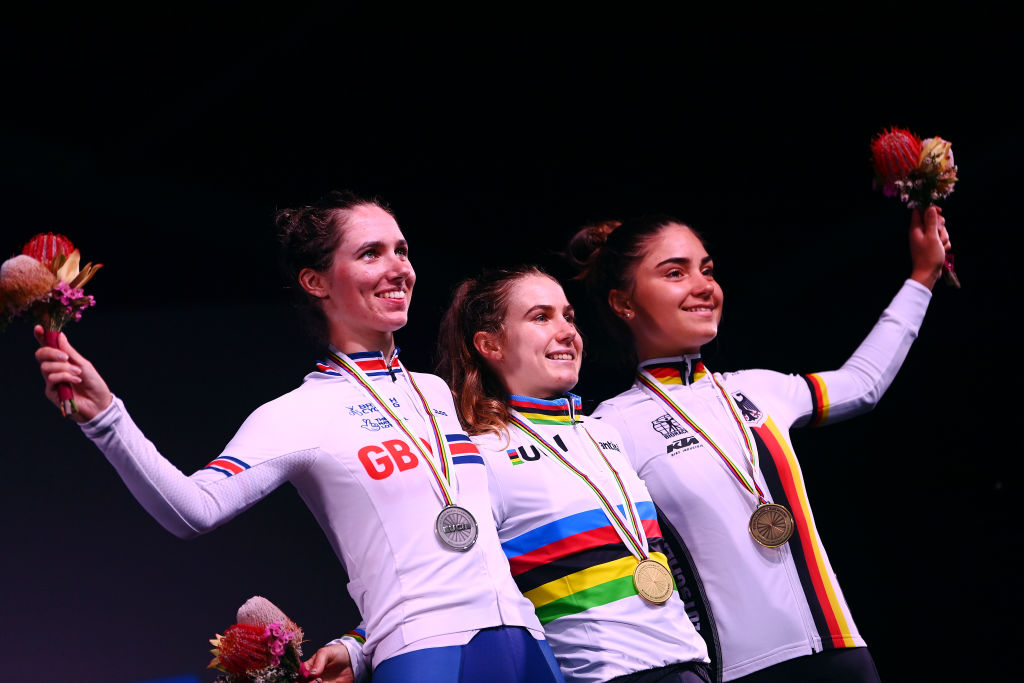
As well as her ninth place in Roubaix, the former British road race champion regards 16th at the World Championships road race on a hard and hilly course in Wollongong as the other result she was proudest of in 2022. “That was the best I could have got out of myself physically, the way the race played out. I don’t have any regrets,” she says.
Finishing 13 seconds down on the leaders, her performance also yielded an under-23 women’s silver medal. “Personally, I’m not the biggest fan of it,” she says of the race within a race format. “I think if you’re going to have a race, it should be separate. A race is about tactics, and the winner wants to come across the line celebrating, not in the middle of the pack.” There will be a wait until 2025 for a standalone U23 women’s road race at the World Championships.
Georgi also highlights that the women’s elite time trial could easily be separated to create an under-23 event: “The men’s major championships have always had it, we always had it in Europeans, so I don’t see why it couldn’t be that.”
While her immediate focus is the Classics, Georgi is still discovering what kind of rider she is and doesn’t want to put a ceiling on what she can do. “I still have the capabilities to do well on some shorter climbs and time trialling,” she adds. Races like Amstel Gold Race are also potentially in her wheelhouse. Then there’s track racing; she was second to Lotte Kopecky in the elimination race at the 2022 European Track Championships.
In recent years, Team DSM has gained a public perception of meticulous preparation that can border on strict and unbending. Clearly, their way of working chimes with Georgi: mid-season, she extended her contract with the WorldTour outfit to the end of 2025.
“I think the team have always seen my potential. When I did school [during her first year pro in 2019], or if I had any big crashes or setbacks, they never rushed my recovery,” she says. Notably, two fractured vertebrae at the 2020 Driedaagse Brugge-De Panne left her in a neck brace and affected her confidence.
“I’ve not had this pressure where you come straight of junior and you have to perform,” she says. “I like the vision they saw for me, and it was aligned with what I saw myself as being more of a Classics rider and also a strong lead-out.”
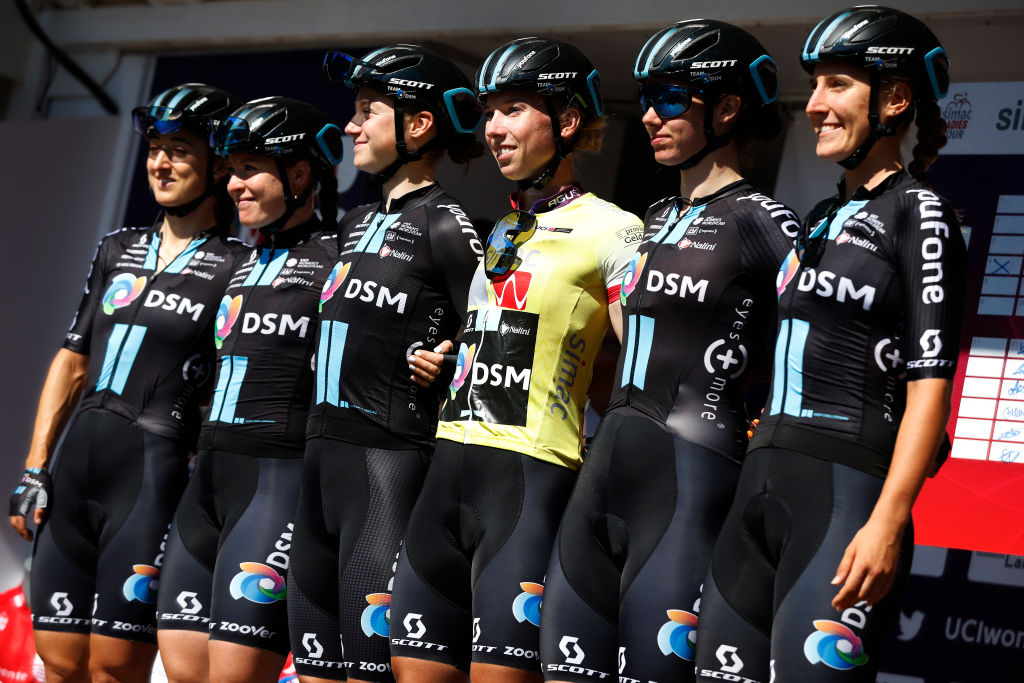
Off the bike, Georgi moved to the Spanish cycling hub of Girona in the summer of 2022, where she is one of the few members of the pro cycling population there who doesn’t drink coffee. “I have more hot chocolate than probably anyone ever,” she says.
And though she is the only pro cyclist called Pfeiffer – she thinks it’s from the American actress Michelle Pfeiffer and her mother’s search for an original moniker during an evening in front of the TV – making a name for herself is proving harder than you might think. “Everyone thinks it’s Georgi. I get called that a lot at race sign-ons: Georgi Pfeiffer, that’s the standard.”
Talk returns to Paris-Roubaix and different possible ways of victory. “Solo, you’d get to enjoy the velodrome,” she says. “But winning a small group sprint, the moment of celebration is so much more enjoyable because it’s a surprise, a realisation of what you’ve done. And you only get that right at the last minute.”
Has she ever imagined winning there? “Potentially,” she says, laughing. “I do like to envision race situations. Less so the outcome, but scenarios.”
When it comes to pro cycling and this racer on the cusp of a breakthrough, all roads don’t lead to Rome, but to Oudenaarde or Roubaix. Finish on the podium there in the spring, and there will be no more mistaking Pfeiffer Georgi.
Formerly the editor of Rouleur magazine, Andy McGrath is a freelance journalist and the author of God Is Dead: The Rise and Fall of Frank Vandenbroucke, Cycling’s Great Wasted Talent
